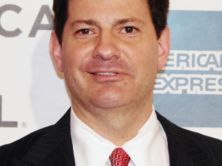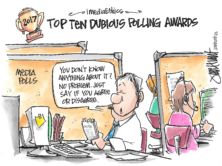Readers complained because the Washington Post did not disclose anything about the Center for Public Integrity when recently publishing one of the center's stories. (Credit: Washington Post)
The Washington Post’s public editor, Andrew Alexander, called on the Post to be more transparent when publishing stories by non-Post reporters.
Alexander wrote specifically about a story by the nonprofit Center for Public Integrity published in the Post. The story, “Obama administration gives billions in stimulus money without environmental safeguards,” was coauthored by two employees of the center – Kristen Lombardi and John Solomon and didn’t include any information explaining about the center. (Solomon was recently named the center’s executive editor.)”
As a result, many readers contacted the Post after the center’s story was published asking more about the center, Alexander wrote. (See the Center for Public Integrity’s story in the Washington Post here.)
“The center is well known among journalists,” but not with readers, Alexander explained.
The center’s website describes it as a nonprofit, nonpartisan and non-advocacy organization providing “investigative journalism in the public interest.” The organization made headlines this fall when it merged with the Huffington Post Investigative Fund. In the merger, the Center for Public Integrity garnered $2 million in grants and a handful of new employees.
Because the Center for Public Integrity’s story got the same placement a Post staff story would, some readers were left with questions about whether the Washington Post supported the views of the center, Alexander detailed.
One reader, Douglas H. Green, reportedly criticized the lack of disclosure, noting that it suggests that the Post believes what the center believes.
Green is quoted as saying that it “creates the perception that the work is The Post’s – and with it the perception, at least among regulators and industry representatives, that The Post endorses the center’s views. That perception clearly compromises The Post’s reputation for unbiased and objective reporting.”
Alexander claimed that the Post does “vet” stories by other news organizations prior to publication, and that the newspaper has to pick up stories by other news outlets and organizations, including the center and another nonprofit, ProPublica, because the Post’s newsroom has shrunk.
According to Alexander’s reporting, The Center for Public Integrity claimed that it carefully fact checked the story before even turning it over to the Washington Post. Solomon, one of the co-authors of the center’s article, is quoted as saying the story “went through an extraordinary fact-checking process.”
And, at the Post, Alexander reported that at least five Post editors and staffers claim to have “reviewed” the story before publication.
But, regardless of the levels of fact-checking, Alexander still found the story should have disclosed more information about the center so readers could be more informed.
“The best remedy is disclosure, which was lacking in this case. In print, The Post should have published a description of the center, its Web address and an explanation of how the story came together,” he wrote.





